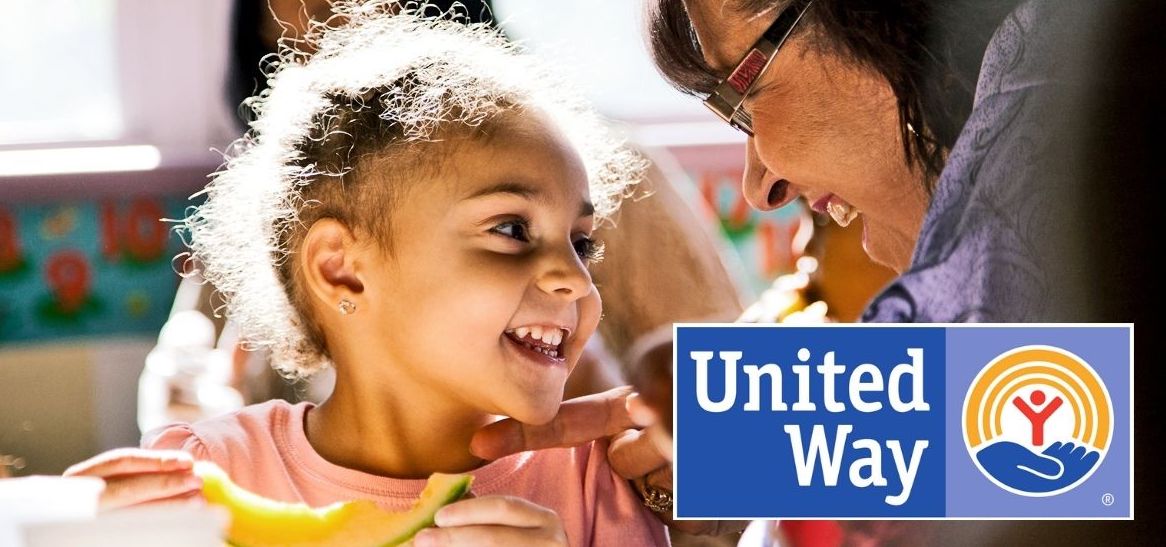For students in Professor Sam Ransbotham’s Machine Learning and Artificial Intelligence class, there was more at stake in their final projects than just letter grades and GPAs. This semester, the undergraduates worked with real data from the Massachusetts chapter of United Way. Students developed models that they hope will help guide the nonprofit’s fundraising, volunteer engagement, and early childhood interventions.
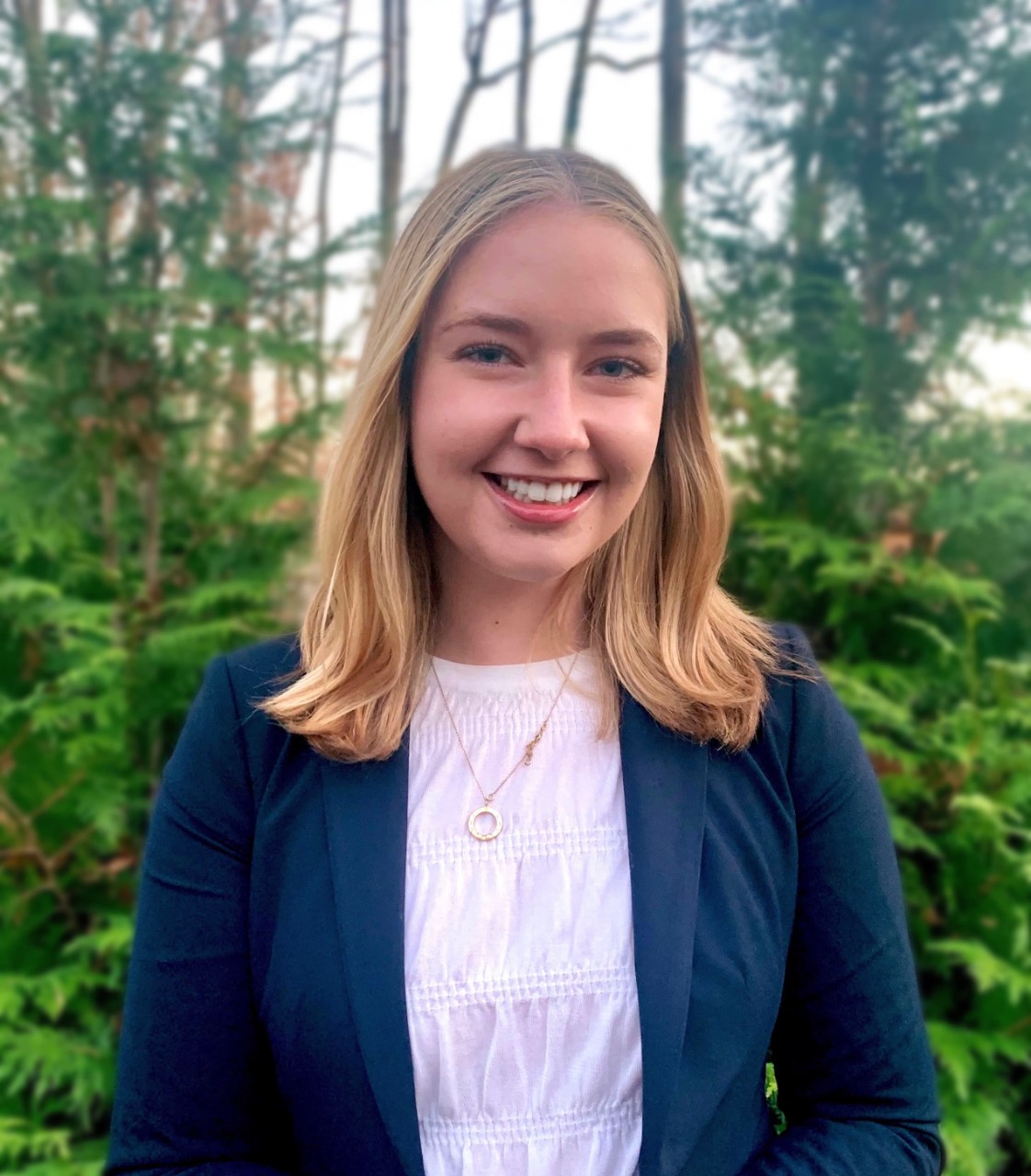
Melissa Walters ’23
“There are real-life consequences to this project. It’s not just a homework assignment,” said Melissa Walters ’23, one of 27 students in the course offered by the Carroll School’s Information Systems Department. Walters, who studies Business Analytics and Finance, spent the semester building a model to impute data in one of the data sets that United Way provided. Imputing data involves creating a predictive model that uses existing information to accurately fill in the gaps that are common with real-world data sets.
One of United Way’s priorities is early childhood intervention, and its work with over 50 childcare providers and other partners has created a vast database of information on educational screening, geographic trends, and developmental stages. However, like practically all real data sets, the database has inconsistencies and missing information, which make it difficult for the nonprofit to do any comprehensive analysis. Citing one example that her imputing project worked to correct, Walters says that the Boston neighborhood of Jamaica Plain is spelled and formatted in 13 different ways throughout the data set, splitting information that should be categorized uniformly into multiple sections.
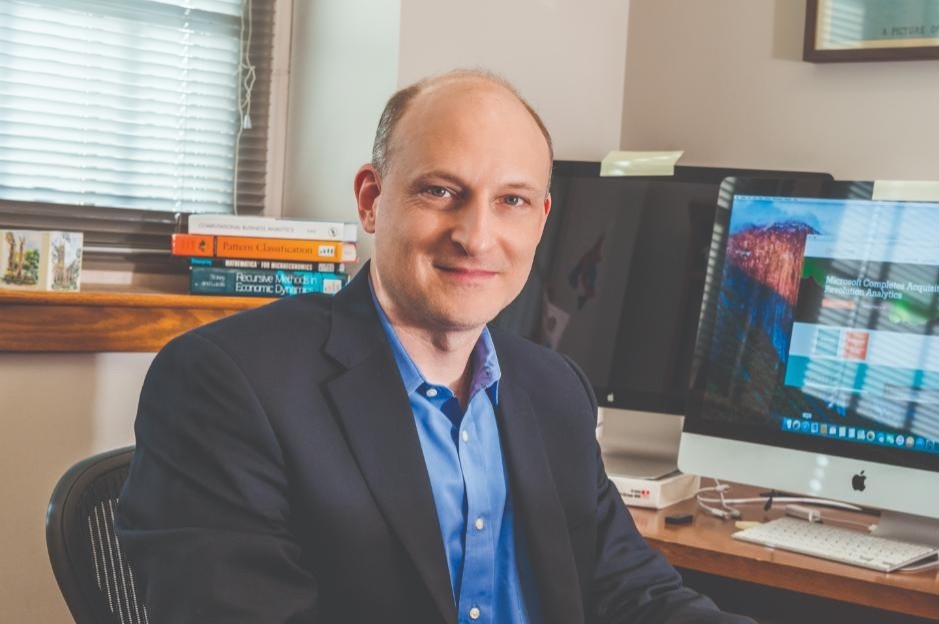
Professor and William S. McKiernan '78 Family Faculty Fellow Sam Ransbotham
In contrast to the synthetic data sources that professors typically generate for educational purposes, real-world data sets tend to be rife with omissions, typos, and incomplete information. In some ways, that added layer of difficulty was the point of the project, says Ransbotham, who is the William S. McKiernan ’78 Family Faculty Fellow. “I’m trying to put students in a position of being able to work with the imperfect real world. We’re in a business school, so students need to be prepared to make real decisions with imperfect data,” he pointed out.
Interdisciplinary Collaboration + Big Data = Social Impact
Machine Learning and Artificial Intelligence was a new class, but this particular partnership with United Way began over a year and a half ago, when Ransbotham met Ellen Dickenson, vice president of analytics at the United Way of Massachusetts Bay and Merrimack Valley. (The School of Social Work has collaborated with the organization for years to promote research and practice partnerships, including projects to reduce homelessness among local families and children in the Boston Public School system.) Ransbotham’s meeting with Dickenson was thanks to the Data Analytics for Social Impact research group at Boston College, which began with a three-year grant from the University’s Institute for the Liberal Arts. The interdisciplinary group, which Ransbotham is part of, includes nine faculty members from across Boston College whose specialties span social work, economics, nursing, education, and business. Despite their disparate backgrounds, all of the members’ research involves using “Big Data” to solve social problems.
Associate Professor Summer Sherburne Hawkins of Boston College’s School of Social Work, who spearheaded the research group with her dean, Gautam N. Yadama, cited “Boston College’s strong commitment to social justice” as setting the stage for the project. “The point of the grant is to say, ‘How can we have an impact on the community? How can we produce research that’s going to move the needle for the people who are involved with these services?’” explained Hawkins, who serves as the project’s principal investigator. The three-year Data Analytics for Social Impact grant will eventually result in the launch of an interdisciplinary graduate course during the 2021-2022 academic year, but students are already feeling its impact in the classroom in the form of Ransbotham’s partnership with United Way.
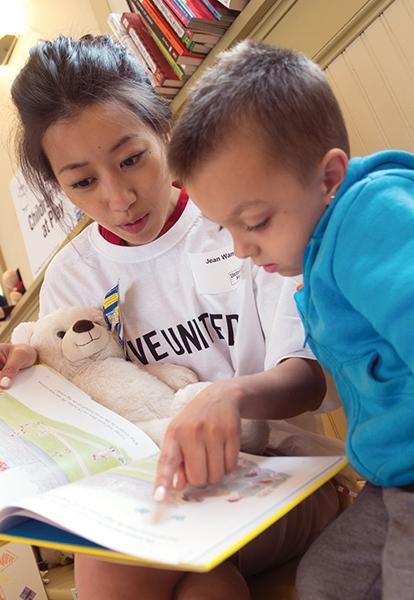
A United Way volunteer reads to a young child. One of the data sets that students analyzed included data about United Way's early childhood intervention programs. (Photo via United Way of Massachusetts Bay and Merrimack Valley)
Throughout the first year of the grant, members of the research group heard from a variety of speakers, including Dickenson, who presented about United Way’s needs and opportunities for data and analytics. Like many organizations, United Way generates vast amounts of data that need analyzing: from early childhood education test scores to fundraising metrics to volunteer engagement information. And, like all professors who teach data analysis, Ransbotham needed data for his classes to analyze. The mutual benefit was clear.
“Messy, Real-World Data”
In spring 2020, Ransbotham piloted the partnership with his graduate Data Analytics 3 class. Groups of full-time M.B.A. students analyzed two data sets provided by United Way: one with early childhood intervention data and another with information on volunteer engagement and fundraising efforts. At the end of the course, the groups presented their findings to Dickenson as well as to AJ Spagnuolo ’17, a director of analytics at the United Way. “In so many cases I said, ‘Oh yes, you were spot on,’” Dickenson said, referring to insights the groups had about the data.
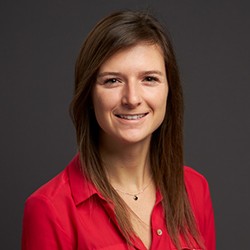
Kailey Rappaport M.B.A. ’21
Working through the “messy, real-world data” benefited the students too, said Kailey Rappaport, M.B.A. ’21, a member of the spring 2020 graduate Data Analytics 3 class. Rappaport, who plans to pursue a career in data analytics or marketing after receiving her M.B.A., emphasized the importance of business school classes offering experience with real data sets and real clients to prepare students for the workforce. Data Analytics 3 is the final course in a series of three Data Analytics courses in the M.B.A. curriculum, so Rappaport and her group used their prior analytics experience as a foundation and took the United Way project as a welcome opportunity to “challenge ourselves a little bit.”
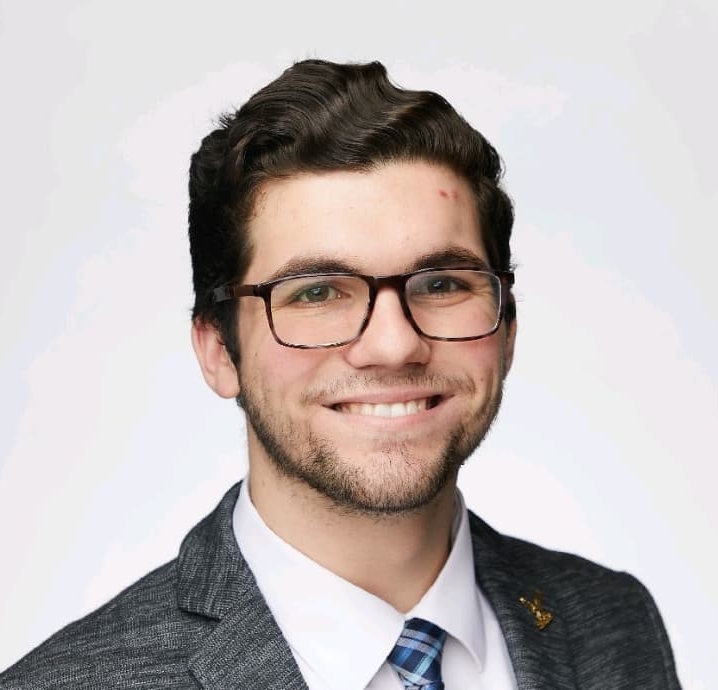
Aidan Lena ’23
“We like to talk a lot in business classes about these theoretical constructs, but it’s really different to actually look at a table that came from a real-world source,” said Aidan Lena ’23, an undergraduate in this semester’s Machine Learning and Artificial Intelligence course. The small classes were held in person and students spent the semester studying theories of artificial intelligence and algorithm-building techniques. Interwoven with the complex information systems concepts were deeper discussions about the ethical implications of machine learning and the importance of implementing technology in a way that doesn’t reinforce existing inequality. After learning about business ethics during his freshman year Portico class, Lena said it felt natural to continue to focus on “the broader ethical implications of the effect of AI on everything and how it’s going to shift the world.”
Those theoretical effects were made tangible during the two class sessions that Dickenson attended virtually. Instead of abstract discussions about synthetic data sets, students heard firsthand about the impact of data on United Way’s work. In addition to answering data-specific questions, she also provided context for the two data sets, sharing about the impact of their early childhood intervention programs and the organizational significance of building a strong donor and volunteer network.
Giving Insights, Gaining Knowledge
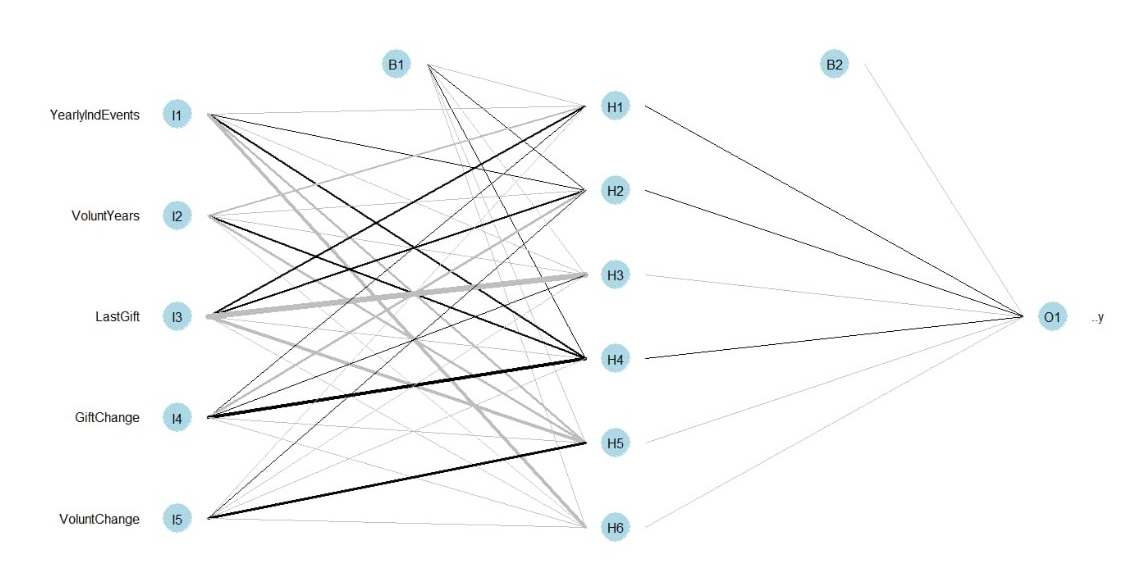
A screenshot of the neural network Aidan Lena '23 built as part of his project to analyze United Way's volunteer and donor activity.
Outside of the classroom, students worked to combine techniques and theory learned in class with the messy reality of real-world data. As their homework assignments developed from initial proposals to final refined models, students used in-class examples to fine-tune their models to fit United Way’s needs. And, although this semester’s projects were individual—in keeping with COVID protocols and in contrast to last spring’s M.B.A. group projects—there was still a sense of camaraderie among the undergraduates. “To have dozens of students working on the same database and simultaneously discovering things about it is really a great opportunity for everyone involved,” said Walters.
The undergraduates worked with the same two data sets as the M.B.A. students, although they presented a different type of analysis to Dickenson at the end of the semester. Unlike the M.B.A. data analytics class, which focused on analyzing past data and looking for historical patterns, Machine Learning and Artificial Intelligence involves predictive models that provide a framework for looking at future data. “Part of our objective this semester is to set [United Way] up to give value in the future. Rather than thinking about these as one-off analyses, United Way is going to generate the same type of data on an ongoing basis. Just because my semester is over doesn’t mean that their work stops,” says Ransbotham, indicating the ongoing value of a well-tuned computer model for analyzing future data.
In the spirit of the Data Analytics for Social Impact group, Ransbotham is glad that those models are going toward a good cause: “If students are going to put in effort for a learning experience, rather than yet another analysis of a synthetic data set, why don’t we try to use that effort towards something that can help?”
The effort that students are putting in is substantial. “I’ll probably spend upwards of 30 hours working with this model,” said Walters, “but it’s worth it.” She measures the value by not only the skills she’s learning but also the chance to leverage this know-how for others in the wider community. “The class does speak to BC’s identity,” she notes, referring to the accent on social justice at a Jesuit university. “We’re learning and it’s educational for us, but we’re also helping people in the end. That feels really important.”
Rachel Bird ’23 is a content development specialist (and part-time M.B.A. student) at the Carroll School of Management.



